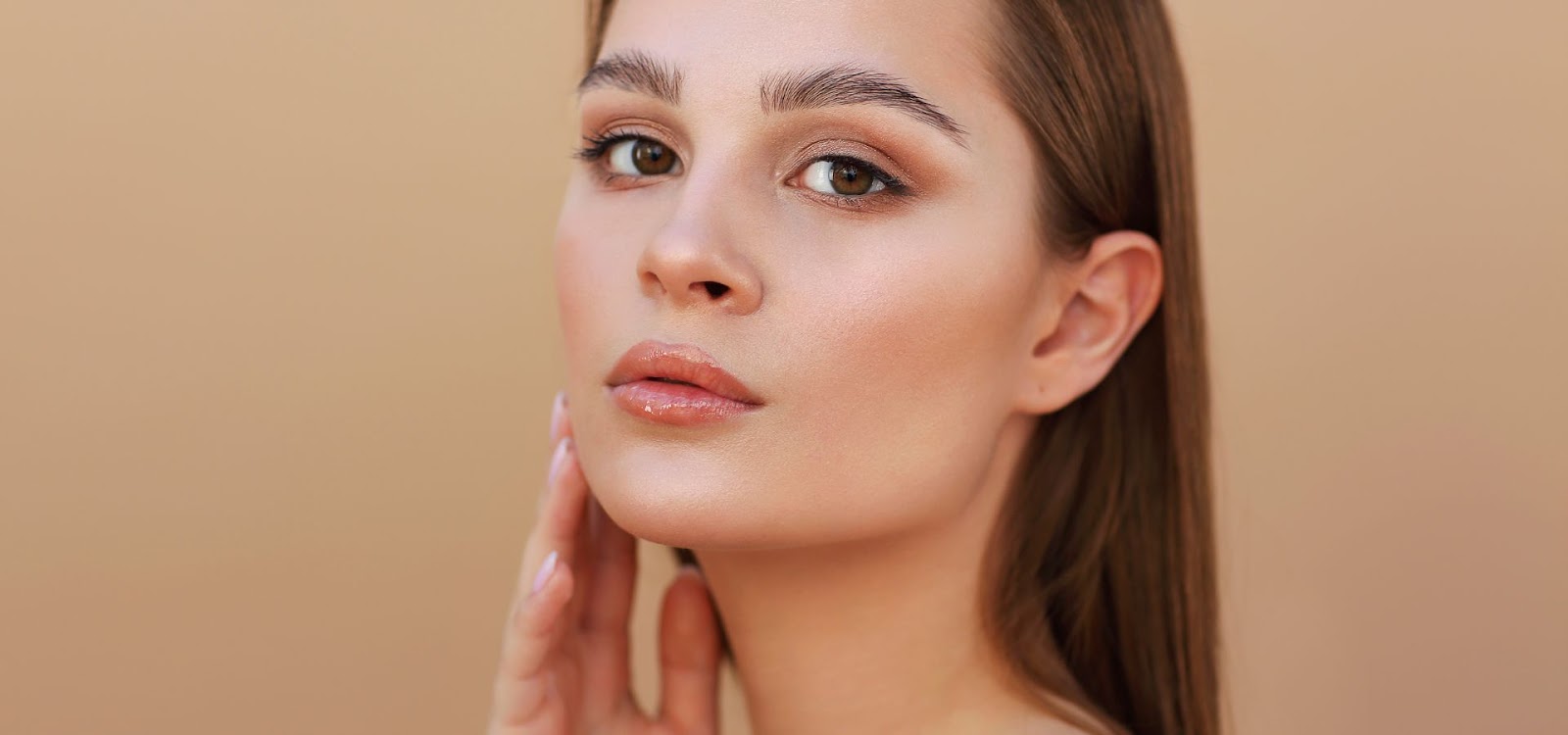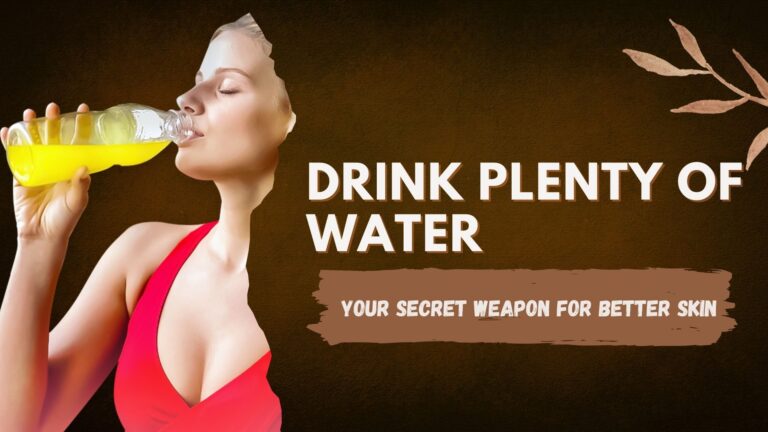If you’re looking for an easy, natural, and cost-effective way to improve your skin, the answer might be as simple as drinking more water. Water is often called the “elixir of life” for good reason—it supports countless bodily functions, including maintaining healthy skin. While we often turn to skincare products to solve our skin woes, staying hydrated from within is just as important. In this article, we’ll explore how drinking plenty of water can be your secret weapon for achieving glowing, youthful, and healthy skin.

The Importance of Hydration for Skin Health
Your skin is the largest organ in your body, and like every other organ, it needs water to function properly. When you’re dehydrated, your skin is one of the first places it shows. Lack of water in the body can lead to skin that feels dry, tight, and less resilient. Staying hydrated helps maintain your skin’s moisture barrier, which keeps it looking plump, smooth, and vibrant. Hydration also helps flush out toxins, which can otherwise contribute to skin issues like breakouts or dullness.
How Water Benefits Your Skin
Hydration and Skin Elasticity
Water helps to maintain the skin’s elasticity, which is crucial for keeping it looking youthful. Well-hydrated skin is more flexible and less prone to developing fine lines and wrinkles. The elasticity in your skin allows it to bounce back after facial expressions or environmental stressors, reducing the appearance of aging.
Water’s Role in Detoxification and Clear Skin
Your body naturally detoxifies through the liver and kidneys, but water aids in the removal of waste and toxins from the skin. When you’re hydrated, your body can efficiently expel these toxins, reducing the risk of clogged pores and breakouts. Drinking enough water helps keep your complexion clear and radiant.
The Connection Between Water and Skin Tone
Water helps to improve circulation, which gives your skin a natural glow. It can enhance the oxygen flow to the skin cells, improving overall skin tone and reducing any dull or tired-looking skin. Hydrated skin tends to have a more even, smooth texture, contributing to a brighter complexion.
Common Skin Issues Related to Dehydration
Dryness and Flakiness
Dehydrated skin often manifests as dry, flaky patches, especially in areas like the cheeks, forehead, and around the nose. When you don’t drink enough water, your skin loses moisture and can feel rough to the touch.
Dull Skin and Lack of Radiance
If your skin looks dull and lacks radiance, dehydration could be the culprit. Water helps maintain your skin’s natural glow by boosting cell turnover and improving blood circulation to the skin’s surface.
Premature Aging and Fine Lines
When your skin doesn’t get enough water, it loses elasticity, which can make it more prone to fine lines and wrinkles. Dehydration exaggerates the signs of aging, making your skin look older than it actually is.
Water vs. Topical Moisturizers: What’s the Difference?
Internal Hydration vs. External Moisturization
Drinking water hydrates your skin from within, while moisturizers work to lock in moisture from the outside. Both are essential for maintaining healthy, hydrated skin. Think of water as feeding your skin from the inside and moisturizers as sealing in that hydration on the surface.
Why Both Are Necessary for Healthy Skin
Even if you drink enough water, environmental factors like cold weather, wind, or pollution can strip moisture from your skin. That’s why a combination of internal hydration (drinking water) and external hydration (using moisturizers) is crucial for maintaining optimal skin health.
Can Drinking Water Alone Prevent Dry Skin?
While staying hydrated is vital, drinking water alone may not completely prevent dry skin, especially if environmental factors are at play. A proper skincare routine, along with adequate hydration, is key to keeping your skin soft and smooth.

How Much Water Should You Drink for Better Skin?
Recommended Daily Intake
The general recommendation is to drink around eight 8-ounce glasses of water a day, which is about 2 liters or half a gallon. However, individual needs can vary based on factors like activity level, climate, and body size.
Factors That Affect Hydration Levels
Exercise, sweating, and exposure to dry air or heat can increase your body’s need for water. You may need to adjust your water intake depending on these factors to ensure that your skin stays hydrated.
Signs That You’re Not Drinking Enough Water
Dry lips, dull skin, and a lack of energy are all signs that you’re not getting enough water. Other symptoms include headaches, dark urine, and skin that feels tight and rough.
The Best Times to Drink Water for Skin Health
Drinking Water First Thing in the Morning
Starting your day with a glass of water helps rehydrate your body after a night’s rest. This can give your skin an instant hydration boost and set the tone for a glowing complexion throughout the day.
Staying Hydrated Throughout the Day
It’s essential to sip water consistently throughout the day, rather than drinking large amounts all at once. This ensures your skin stays hydrated without overwhelming your system.
Hydration Before and After Exercise
Exercise depletes water levels, so drinking water before, during, and after physical activity is essential for replenishing lost fluids and maintaining healthy skin.
Can Drinking Water Cure Acne?
Water’s Role in Detoxifying the Skin
Drinking water helps flush out toxins that can contribute to acne breakouts. By keeping your body and skin hydrated, you’re aiding in the detoxification process, which can result in clearer skin.
Myths vs. Reality of Water’s Effect on Acne
While drinking water alone won’t cure acne, it can support other treatments and improve the overall condition of your skin. Water helps balance oil production and reduces the risk of clogged pores, but a comprehensive skincare routine is still necessary.
What Else Is Needed to Improve Acne-Prone Skin?
In addition to staying hydrated, cleansing, exfoliating, and moisturizing are critical for managing acne-prone skin. Drinking water is an important piece of the puzzle but not the sole solution.
Tips for Increasing Your Water Intake
Infusing Water with Fruits and Herbs for Flavor
If plain water bores you, try adding slices of lemon, cucumber, or berries for a refreshing twist. Herbs like mint or basil can also enhance the flavor and make drinking water more enjoyable.
Using Apps and Reminders to Stay Hydrated
There are plenty of apps available that can help you track your water intake and send you reminders throughout the day. This is a great way to stay on top of your hydration goals.
Carrying a Reusable Water Bottle
A reusable water bottle is an easy way to remind yourself to drink water throughout the day. Keep it by your side whether you’re at work, at home, or on the go.

The Role of Diet in Skin Hydration
Hydrating Foods That Boost Skin Health
Foods like watermelon, cucumber, and celery are high in water content and can help keep your skin hydrated from the inside out. Incorporating these into your diet is a tasty way to support your skin.
Reducing Dehydrating Beverages (Coffee, Alcohol)
Drinks like coffee and alcohol can have a dehydrating effect on your skin. While you don’t have to cut them out completely, be mindful of your intake and balance it with plenty of water.
How a Balanced Diet Complements Hydration
A well-rounded diet that includes plenty of fruits, vegetables, and whole grains helps your body retain moisture and improves the overall health of your skin.
Does the Quality of Water Matter for Skin Health?
Tap Water vs. Filtered Water
While tap water is safe to drink in most places, filtered water can remove impurities that may affect your skin. Some people find that switching to filtered water improves their complexion, especially if their tap water contains chlorine or other chemicals.
The Benefits of Mineral-Rich Water
Mineral-rich water can provide additional benefits for your skin by supplying essential nutrients like magnesium and calcium. These minerals support your skin’s overall health and hydration.
How Hard Water Affects Skin
Hard water, which contains high levels of minerals, can leave a residue on your skin that clogs pores and causes irritation. If you live in an area with hard water, using a water softener or filtering your water might help improve your skin’s appearance.
Water-Based Skincare Products to Supplement Hydration
Hyaluronic Acid and Water-Binding Ingredients
Skincare products that contain hyaluronic acid and other water-binding ingredients can help your skin retain moisture, keeping it hydrated and plump.
Water-Based Moisturizers and Serums
Look for lightweight, water-based moisturizers and serums that provide deep hydration without clogging your pores. These products are ideal for layering and locking in moisture.
Misting Sprays for On-the-Go Hydration
Facial misting sprays are a quick and easy way to give your skin a boost of hydration during the day. They’re especially useful in dry environments or after a workout.
Hydration and Your Skin Type
Oily Skin: Why You Still Need Water
Even if you have oily skin, hydration is essential. Drinking water helps regulate oil production, preventing your skin from becoming overly greasy or clogged.
Dry Skin: Increasing Hydration from the Inside Out
For those with dry skin, staying hydrated is crucial to maintaining a healthy moisture barrier. Drinking plenty of water helps alleviate the tightness and discomfort associated with dry skin.
Combination Skin: Finding the Right Balance
Combination skin can benefit from balanced hydration, which helps maintain an even skin tone and texture. Drinking water supports the different needs of oily and dry areas.
Debunking Myths About Drinking Water for Skin Health
Myth 1: Drinking Water Alone Can Fix All Skin Issues
While drinking water is essential for skin health, it’s not a cure-all. A comprehensive skincare routine, proper diet, and other healthy habits are also necessary for glowing skin.
Myth 2: You Can Hydrate Your Skin by Splashing Water on It
Splashing water on your face doesn’t hydrate your skin as drinking water does. In fact, letting water evaporate on your skin without moisturizing afterward can lead to even more dryness.
Myth 3: Hydration Doesn’t Affect Oily Skin
Hydration plays a crucial role in all skin types, including oily skin. Proper hydration can actually help balance oil production and improve the overall texture of oily skin.
Conclusion
In conclusion, drinking plenty of water is one of the simplest and most effective ways to improve your skin’s health. From boosting elasticity to supporting detoxification, hydration works wonders for your complexion. However, it’s important to remember that water alone won’t solve all your skin issues. A healthy skincare routine, along with a balanced diet and proper hydration, is the key to achieving radiant, glowing skin. So grab your water bottle and make hydration a priority—your skin will thank you!
FAQs
How long does it take to see skin improvements from drinking more water?
You may start to notice improvements in your skin’s appearance within a few days to a couple of weeks, depending on your hydration levels and overall health.
Is there such a thing as drinking too much water for your skin?
While drinking too much water is rare, it’s important to drink in moderation. Excessive water intake can dilute essential minerals in your body, which can affect skin health.
Does drinking water reduce under-eye puffiness?
Yes, staying hydrated can help reduce fluid retention and minimize under-eye puffiness.
What are the best hydrating foods for better skin?
Foods like watermelon, cucumbers, oranges, and leafy greens have high water content and can boost skin hydration.


